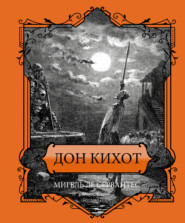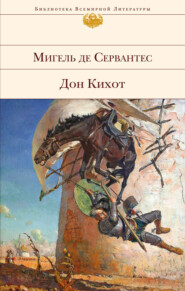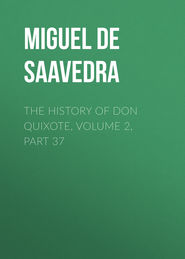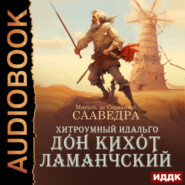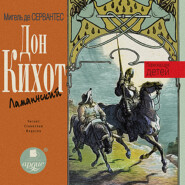По всем вопросам обращайтесь на: info@litportal.ru
(©) 2003-2025.
✖
The Exemplary Novels of Cervantes
Настройки чтения
Размер шрифта
Высота строк
Поля
"In that city, such are the facilities that offer themselves, I soon gutted my bag, and left it with as many wrinkles as a bridegroom's pocket-handkerchief. The person who was charged with the collection of the money, hastened to track my steps; I was taken, and met with but scant indulgence; only, in consideration of my youth, their worships the judges contented themselves with introducing me to the acquaintance of the whipping-post, to have the flies whisked from my shoulders for a certain time, and commanding me to abstain from revisiting the Court and Capital during a period of four years. I took the matter coolly, bent my shoulders to the operation performed at their command, and made so much haste to begin my prescribed term of exile, that I had no time to procure sumpter mules, but contented myself with selecting from my valuables such as seemed most important and useful.
"I did not fail to include this pack of cards among them," – here the speaker exhibited that oviform specimen already mentioned – "and with these I have gained my bread among the inns and taverns between Madrid and this place, by playing at Vingt-et-un. It is true they are somewhat soiled and worn, as your worship sees; but for him who knows how to handle them, they possess a marvellous virtue, which is, that you never cut them but you find an ace at the bottom; if your worship then is acquainted with the game, you will see what an advantage it is to know for certain that you have an ace to begin with, since you may count it either for one or eleven; and so you may be pretty sure that when the stakes are laid at twenty-one, your money will be much disposed to stay at home.
"In addition to this, I have acquired the knowledge of certain mysteries regarding Lansquenet and Reversis, from the cook of an ambassador who shall be nameless, – insomuch that, even as your worship might pass as master in the cutting of spatterdashes, so could I, too, take my degrees in the art of flat-catching.
"With all these acquirements, I am tolerably sure of not dying from hunger, since, even in the most retired farm-house I come to, there is always some one to be found who will not refuse himself the recreation of a few moments at cards. We have but to make a trial where we are; let us spread the net, and it will go hard with us if some bird out of all the Muleteers standing about do not fall into it. I mean to say, that if we two begin now to play at Vingt-et-un as though we were in earnest, some one will probably desire to make a third, and, in that case, he shall be the man to leave his money behind him."
"With all my heart," replied the younger lad: "and I consider that your excellency has done me a great favour by communicating to me the history of your life. You have thereby made it impossible for me to conceal mine, and I will hasten to relate it as briefly as possible. Here it is, then: —
"I was born at Pedroso, a village situate between Salamanca and Medina del Campo. My father is a tailor, as I have said, and taught me his trade; but from cutting with the scissors I proceeded – my natural abilities coming in aid – to the cutting of purses. The dull, mean life of the village, and the unloving conduct of my mother-in-law, were besides but little to my taste. I quitted my birthplace, therefore, repaired to Toledo to exercise my art, and succeeded in it to admiration; for there is not a reliquary suspended to the dress, not a pocket, however carefully concealed, but my fingers shall probe its contents, or my scissors snip it off, though the owner were guarded by the eyes of Argus.
"During four months I spent in Toledo, I was never trapped between two doors, nor caught in the fact, nor pursued by the runners of justice, nor blown upon by an informer. It is true that, eight days ago, a double spy[11 - An alguazil, who, while in the service of justice, is also in that of the thieves. He betrays them, nevertheless, whenever it suits his purpose to do so:] did set forth my distinguished abilities to the Corregidor, and the latter, taking a fancy to me from his description, desired to make my acquaintance; but I am a modest youth, and do not wish to frequent the society of personages so important. Wherefore I took pains to excuse myself from visiting him, and departed in so much haste, that I, like yourself, had no time to procure sumpter-mules or small change, – nay, I could not even find a return-chaise, nor so much as a cart."
"Console yourself for these omissions," replied Pedro del Rincon; "and since we now know each other, let us drop these grand and stately airs, and confess frankly that we have not a blessed farthing between us, nor even shoes to our feet."
"Be it so," returned Diego Cortado, for so the younger boy called himself. "Be it so; and since our friendship, as your worship Señor Rincon is pleased to say, is to last our whole lives, let us begin it with solemn and laudable ceremonies," – saying which, Diego rose to his feet, and embraced the Señor Rincon, who returned the compliment with equal tenderness and emotion.
They then began to play at Vingt-et-un with the cards above described, which were certainly "free from dust and straw,"[12 - "Clean from dust and straw" —limpios de polvo y paja– is a phrase equivalent to "free of the king's dues."] as we say, but by no means free from grease and knavery; and after a few deals, Cortado could turn up an ace as well as Rincon his master. When things had attained this point, it chanced that a Muleteer came out at the porch, and, as Rincon had anticipated, he soon proposed to make a third in their game.
To this they willingly agreed, and in less than half an hour they had won from him twelve reals and twenty-two maravedis, which he felt as sorely as twelve stabs with a dagger and twenty-two thousand sorrows. Presuming that the young chaps would not venture to defend themselves, he thought to get back his money by force; but the two friends laying hands promptly, the one on his dudgeon dagger and the other on his yellow handled knife, gave the Muleteer so much to do, that if his companions had not hastened to assist him, he would have come badly out of the quarrel.
At that moment there chanced to pass by a company of travellers on horseback, who were going to make their siesta at the hostelry of the Alcalde, about half a league farther on. Seeing the affray between the Muleteer with two boys, they interposed, and offered to take the latter in their company to Seville, if they were going to that city.
"That is exactly where we desire to go," exclaimed Rincon, "and we will serve your worships in all that it shall please you to command." Whereupon, without more ado, they sprang before the mules, and departed with the travellers, leaving the Muleteer despoiled of his money and furious with rage, while the hostess was in great admiration of the finished education and accomplishments of the two rogues, whose dialogue she had heard from beginning to end, while they were not aware of her presence.
When the hostess told the Muleteer that she had heard the boys say the cards they played with were false, the man tore his beard for rage, and would have followed them to the other Venta, in the hope of recovering his property; for he declared it to be a serious affront, and a matter touching his honour, that two boys should have cheated a grown man like him. But his companions dissuaded him from doing what they declared would be nothing better than publishing his own folly and incapacity; and their arguments, although they did not console the Muleteer, were sufficient to make him remain where he was.
Meanwhile Cortado and Rincon displayed so much zeal and readiness in the service of the travellers, that the latter gave them a lift behind them for the greater part of the way. They might many a time have rifled the portmanteaus of their temporary masters, but did not, lest they should thereby lose the happy opportunity of seeing Seville, in which city they greatly desired to exercise their talents. Nevertheless, as they entered Seville – which they did at the hour of evening prayer, and by the gate of the custom-house, on account of the dues to be paid, and the trunks to be examined – Cortado could not refrain from making an examination, on his own account, of the valise which a Frenchman of the company carried with him on the croup of his mule. With his yellow-handled weapon, therefore, he gave it so deep and broad a wound in the side that its very entrails were exposed to view; and he dexterously drew forth two good shirts, a sun-dial, and a memorandum book, things that did not greatly please him when he had leisure to examine them. Thinking that since the Frenchman carried that valise on his own mule, it must needs contain matters of more importance than those he had captured, Cortado would fain have looked further into it, but he abstained, as it was probable that the deficiency had been already discovered, and the remaining effects secured. Before performing this feat the friends had taken leave of those who had fed them on their journey, and the following day they sold the two shirts in the old clothes' market, which is held at the gate of the Almacen or arsenal, obtaining twenty reals for their booty.
Having despatched this business, they went to see the city, and admired the great magnificence and vast size of its principal church, and the vast concourse of people on the quays, for it happened to be the season for loading the fleet. There were also six galleys on the water, at sight of which the friends could not refrain from sighing, as they thought the day might come when they should be clapped on board one of those vessels for the remainder of their lives. They remarked the large number of basket-boys, porters, &c., who went to and fro about the ships, and inquired of one among them what sort of a trade it was – whether it was very laborious – and what were the gains.
An Asturian, of whom they made the inquiry, gave answer to the effect that the trade was a very pleasant one, since they had no harbour-dues to pay, and often found themselves at the end of the day with six or seven reals in their pocket, with which they might eat, drink, and enjoy themselves like kings. Those of his calling, he said, had no need to seek a master to whom security must be given, and you could dine when and where you please, since, in the city of Seville, there is not an eating-house, however humble, where you will not find all you want at any hour of the day.
The account given by the Asturian was by no means discouraging to the two friends, neither did his calling seem amiss to them; nay, rather, it appeared to be invented for the very purpose of enabling them to exercise their own profession in secresy and safety, on account of the facilities it offered for entering houses. They consequently determined to buy such things as were required for the instant adoption of the new trade, especially as they could enter upon it without undergoing any previous scrutiny.
In reply to their further inquiries, the Asturian told them that it would be sufficient if each had a small porter's bag of linen, either new or second-hand, so it was but clean, with three palm-baskets, two large and one small, wherein to carry the meat, fish, and fruit purchased by their employers, while the bag was to be used for carrying the bread. He took them to where all these things were sold; they supplied themselves out of the plunder of the Frenchman, and in less than two hours they might have been taken for regular graduates in their new profession, so deftly did they manage their baskets, and so jauntily carry their bags. Their instructor furthermore informed them of the different places at which they were to make their appearance daily: in the morning at the shambles, and at the market of St. Salvador; on fast-days at the fish-market; every afternoon on the quay, and on Thursdays at the fair.
All these lessons the two friends carefully stored in their memory, and the following morning both repaired in good time to the market of St. Salvador. Scarcely had they arrived before they were remarked by numbers of young fellows of the trade, who soon perceived, by the shining brightness of their bags and baskets, that they were new beginners. They were assailed with a thousand questions, to all which they replied with great presence of mind and discretion. Presently up came two customers, one of whom had the appearance of a Student, the other was a Soldier; both were attracted by the clean and new appearance of their baskets; and he who seemed to be a student beckoned Cortado, while the soldier engaged Rincon. "In God's name be it!"[13 - This is a formula used in Spain by those who do a thing for the first time. —Viardot.] exclaimed both the novices in a breath – Rincon adding, "It is a good beginning of the trade, master, since it is your worship that is giving me my hansel." "The hansel shall not be a bad one," replied the soldier, "seeing that I have been lucky at cards of late, and am in love. I propose this day to regale the friends of my lady with a feast, and am come to buy the materials." "Load away, then, your worship," replied Rincon, "and lay on me as much as you please, for I feel courage enough to carry off the whole market; nay, if you should desire me to aid in cooking what I carry, it shall be done with all my heart."
The soldier was pleased with the boy's ready good-will, and told him that if he felt disposed to enter his service he would relieve him from the degrading office he then bore; but Rincon declared, that since this was the first day on which he had tried it, he was not willing to abandon the work so soon, or at least until he had seen what profit there was to be made of it; but if it did not suit him, he gave the gentleman his word that he would prefer the service offered him even to that of a Canon.
The soldier laughed, loaded him well, and showed him the house of his lady, bidding him observe it well that he might know it another time, so that he might be able to send him there again without being obliged to accompany him. Rincon promised fidelity and good conduct; the soldier gave him three quartos,[14 - The Quarto contains four Maravedis.] and the lad returned like a shot to the market, that he might lose no opportunity by delay. Besides, he had been well advised in respect of diligence by the Asturian, who had likewise told him that when he was employed to carry small fish, such as sprats, sardines, or flounders, he might very well take a few for himself and have the first taste of them, were it only to diminish his expenses of the day, but that he must do this with infinite caution and prudence, lest the confidence of the employers should be disturbed; for to maintain confidence was above all things important in their trade.
But whatever haste Rincon had made to return, he found Cortado at his post before him. The latter instantly inquired how he had got on. Rincon opened his hand and showed the three quartos; when Cortado, thrusting his arm into his bosom, drew forth a little purse which appeared to have once been of amber-coloured silk, and was not badly filled. "It was with this," said he, "that my service to his reverence the Student has been rewarded – with this and two quartos besides. Do you take it, Rincon, for fear of what may follow."
Cortado had scarcely given the purse in secret to his companion, before the Student returned in a great heat, and looking in mortal alarm. He no sooner set eyes on Cortado, than, hastening towards him, he inquired if he had by chance seen a purse with such and such marks and tokens, and which had disappeared, together with fifteen crowns in gold pieces, three double reals, and a certain number of maravedis in quartos and octavos. "Did you take it from me yourself," he added, "while I was buying in the market, with you standing beside me?"
To this Cortado replied with perfect composure, "All I can tell you of your purse is, that it cannot be lost, unless, indeed, your worship has left it in bad hands."
"That is the very thing, sinner that I am," returned the Student. "To a certainty I must have left it in bad hands, since it has been stolen from me." "I say the same," rejoined Cortado, "but there is a remedy for every misfortune excepting death. The best thing your worship can do now is to have patience, for after all it is God who has made us, and after one day there comes another. If one hour gives us wealth, another takes it away; but it may happen that the man who has stolen your purse may in time repent, and may return it to your worship, with all the interest due on the loan."
"The interest I will forgive him," exclaimed the Student; and Cortado resumed: – "There are, besides, those letters of excommunication, the Paulinas;[15 - Paulinas are the letters of excommunication despatched by the ecclesiastical courts for the discovery of such things as are supposed to be stolen or maliciously concealed.] and there is also good diligence in seeking for the thief, which is the mother of success. Of a truth, Sir, I would not willingly be in the place of him who has stolen your purse; for if your worship have received any of the sacred orders, I should feel as if I had been guilty of some great crime – nay of sacrilege – in stealing from your person."
"Most certainly the thief has committed a sacrilege," replied the Student, in pitiable tones; "for although I am not in orders, but am only a Sacristan of certain nuns, yet the money in my purse was the third of the income due from a chapelry, which I had been commissioned to receive by a priest, who is one of my friends, so that the purse does, in fact, contain blessed and sacred money."
"Let him eat his sin with his bread," exclaimed Rincon at that moment; "I should be sorry to become bail for the profit he will obtain from it. There will be a day of judgment at the last, when all things will have to pass, as they say, through the holes of the colander, and it will then be known who was the scoundrel that has had the audacity to plunder and make off with the whole third of the revenue of a chapelry! But tell me, Mr. Sacristan, on your life, what is the amount of the whole yearly income?"
"Income to the devil, and you with it,[16 - (This footnote is missing from the printed edition.)]" replied the Sacristan, with more rage than was becoming; "am I in a humour to talk to you about income? Tell me, brother, if you know anything of the purse; if not, God be with you – I must go and have it cried."
"That does not seem to me so bad a remedy," remarked Cortado; "but I warn your worship not to forget the precise description of the purse, nor the exact sum that it contains; for if you commit the error of a single mite, the money will never be suffered to appear again while the world is a world, and that you may take for a prophecy."
"I am not afraid of committing any mistake in describing the purse," returned the Sacristan, "for I remember it better than I do the ringing of my bells, and I shall not commit the error of an atom." Saying this, he drew a laced handkerchief from his pocket to wipe away the perspiration which rained down his face as from an alembic; but no sooner had Cortado set eyes on the handkerchief, than he marked it for his own.
When the Sacristan had got to a certain distance, therefore, Cortado followed, and having overtaken him as he was mounting the steps of a church, he took him apart, and poured forth so interminable a string of rigmarole, all about the theft of the purse, and the prospect of recovering it, that the poor Sacristan could do nothing but listen with open mouth, unable to make head or tail of what he said, although he made him repeat it two or three times.
Cortado meanwhile continued to look fixedly into the eyes of the Sacristan, whose own were rivetted on the face of the boy, and seemed to hang, as it were, on his words. This gave Cortado an opportunity to finish his job, and having cleverly whipped the handkerchief out of the pocket, he took leave of the Sacristan, appointing to meet him in the evening at the same place, for he suspected that a certain lad of his own height and the same occupation, who was a bit of a thief, had stolen the purse, and he should be able to ascertain the fact in a few days, more or less.
Somewhat consoled by this promise, the Sacristan took his leave of Cortado, who then returned to the place where Rincon had privily witnessed all that had passed. But a little behind him stood another basket-boy, who had also seen the whole transaction; and at the moment when Cortado passed the handkerchief to Rincon, the stranger accosted the pair.
"Tell me, gallant gentlemen," said he, "are you admitted to the Mala Entrada,[17 - Mala Entrada, the evil way.] or not?"
"We do not understand your meaning, noble Sir," replied Rincon.
"How! not entered, brave Murcians?" replied the other.
"We are neither of Murcia[18 - In the slang dialect of Spain, Murcian and Murcia, mean thief, and the land of thieves.] nor of Thebes," replied Cortado. "If you have anything else to say to us, speak; if not, go your ways, and God be with you."
"Oh, your worships do not understand, don't you?" said the porter; "but I will soon make you understand, and even sup up my meaning with a silver spoon. I mean to ask you, gentlemen, are your worships thieves? But why put the question, since I see well that you are thieves; and it is rather for you to tell me how it is that you have not presented yourselves at the custom-house of the Señor Monipodio."
"Do they then pay duty on the right of thieving in this country, gallant Sir?" exclaimed Rincon.
"If they do not pay duty, at least they make them register themselves with the Señor Monipodio, who is the father, master, and protector of thieves; and I recommend you to come with me and pay your respects to him forthwith, or, if you refuse to do that, make no attempt to exercise your trade without his mark and pass-word, or it will cost you dearly."
"I thought, for my part," remarked Cortado, "that the profession of thieving was a free one, exempt from all taxes and port dues; or, at least, that if we must pay, it is something to be levied in the lump, for which we give a mortgage upon our shoulders and our necks; but since it is as you say, and every land has its customs, let us pay due respect to this of yours; we are now in the first country of the world, and without doubt the customs of the place must be in the highest degree judicious. Wherefore your worship may be pleased to conduct us to the place where this gentleman of whom you have spoken is to be found. I cannot but suppose, from what you say, that he is much honoured, of great power and influence, of very generous nature, and, above all, highly accomplished in the profession."
"Honoured, generous, and accomplished! do you say?" replied the boy: "aye, that he is; so much so, that during the four years that he has held the seat of our chief and father, only four of us have suffered at Finibusterry;[19 - In finibus terræ, that is to say, at the gallows, or garotte, which to the thief is the end of the earth and all things.] some thirty or so, and not more, have lost leather; and but sixty-two have been lagged."
"Truly, Sir," rejoined Rincon, "all this is Hebrew to us; we know no more about it than we do of flying."
"Let us be jogging, then," replied the new-comer, "and on the way I will explain to you these and other things, which it is requisite you should know as pat as bread to mouth;" and, accordingly, he explained to them a whole vocabulary of that thieves' Latin which they call Germanesco, or Gerigonza, and which their guide used in the course of his lecture, – by no means a short one, for the distance they had to traverse was of considerable length.
On the road, Rincon said to his new acquaintance, "Does your worship happen to be a Thief?"
"Yes," replied the lad, "I have that honour, for the service of God and of all good people; but I cannot boast of being among the most distinguished, since I am as yet but in the year of my novitiate."
"It is news to me," remarked Cortado, "that there are thieves for the service of God and of good people."
"Señor," the other replied, "I don't meddle with theology; but this I know, that every one may serve God in his vocation, the more so as daddy Monipodio keeps such good order in that respect among all his children."







